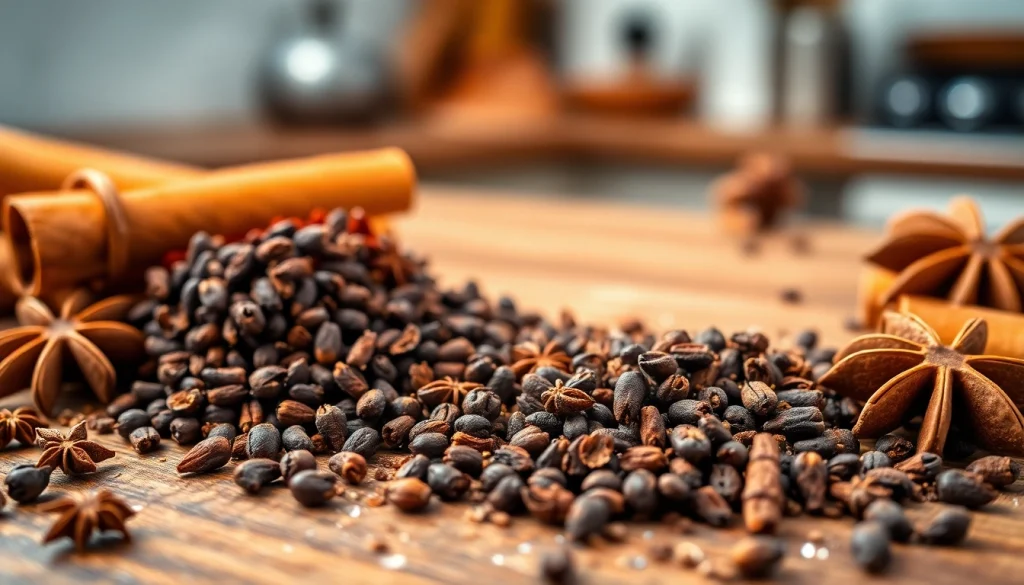
Understanding Cloves: What They Are and Their Origins
1. What Are Cloves?
Cloves are the aromatic flower buds of the tree Syzygium aromaticum, which belongs to the Myrtaceae family. These buds are dark brown in color, have a unique, intense flavor, and a warm, sweet aroma that makes them highly sought after in culinary and medicinal applications. Native to the Maluku Islands, also known as the Spice Islands of Indonesia, cloves are used worldwide, not only for flavoring but also for their numerous health benefits.
2. The History of Cloves
The history of cloves dates back thousands of years, making them one of the earliest spices in human civilization. They were highly prized in ancient trade, particularly in the spice routes that connected the East to Europe. Cloves were so valued that they were sometimes used as currency. Ancient civilizations utilized cloves for their aromatic qualities, both in cooking and for medicinal purposes. They gained a significant role in global trade during the spice boom of the 17th century, which shaped economic relationships and trade routes.
3. How Cloves Are Harvested and Processed
The harvesting of cloves is a meticulous process that generally occurs twice a year. Clove buds are collected just before they bloom, when they are still tight and green, to ensure optimal flavor and aroma. After harvesting, the buds are dried in the sun until they turn a characteristic brown color. This drying process can take several days, and it is crucial for developing the unique taste that cloves are known for. Proper handling and storing conditions are essential to maintain their potency and flavor profile.
The Culinary Uses of Cloves
1. Incorporating Cloves into Various Dishes
Cloves are a versatile spice that can enhance both sweet and savory dishes. Their pungent flavor makes them an excellent addition to a variety of culinary preparations. In savory dishes, cloves are often used in spice blends and marinades, giving depth to meat dishes and stews. In sweet dishes, cloves are a key ingredient in holiday favorites such as gingerbread cookies and spice cakes. Additionally, they can be used to flavor rice dishes and to season curries, providing a warm, aromatic foundation.
2. Cloves in Baking and Holiday Recipes
During the holiday season, cloves take center stage in many baking recipes. They are predominantly used in gingerbread, mulled wine, and pumpkin pie. Their sweet yet spicy profile pairs wonderfully with other warming spices like cinnamon and nutmeg. For those looking to experiment in the kitchen, incorporating ground cloves into cookie and cake batters adds a layer of complexity to traditional recipes. It’s advisable to use whole cloves for infusions and beverages and ground cloves for baking to ensure that the flavors blend effectively.
3. Pairing Cloves with Other Flavors
Cloves possess a robust flavor that pairs well with various ingredients. These include citrus fruits, which can temper the spice’s intensity, as well as dried fruits such as raisins and dates, which complement cloves’ sweetness. Other spices, such as allspice, ginger, and cardamom, can create harmonious flavor profiles in both desserts and savory dishes. To bring out the best in cloves, consider combining them with ingredients that balance their bold taste, enhancing overall dish complexity.
The Health Benefits of Cloves
1. Nutritional Profile of Cloves
Cloves are not only a flavorful spice but also a powerhouse of nutrients. They are rich in manganese, a mineral essential for bone health and metabolic processes, and contain other vitamins and minerals in small amounts, such as vitamin K, calcium, and magnesium. Their high antioxidant content assists in combating oxidative stress in the body. Moreover, cloves are low in calories, making them a healthy addition to a balanced diet.
2. Specific Health Benefits Linked to Cloves
Research has shown that cloves offer various health benefits. Some of the most notable include:
- Anti-Inflammatory Properties: Cloves contain eugenol, a compound with significant anti-inflammatory effects, helpful in conditions such as arthritis and osteoarthritis.
- Dental Health: Clove oil has long been used to relieve toothache, thanks to its analgesic properties. It can help fight oral bacteria and reduce inflammation in the gums.
- Digestive Aid: Cloves may help improve digestion by stimulating digestive enzymes and reducing gas and bloating.
- Antioxidant Benefits: The antioxidants in cloves help neutralize free radicals, protecting cells from damage and potentially lowering the risk of chronic diseases.
3. Possible Side Effects and Precautions
While cloves offer numerous health benefits, they must be consumed in moderation, as excessive intake can lead to potential side effects. High doses of clove oil may cause liver issues, gastrointestinal problems, and irritation of the mucous membranes. Individuals with bleeding disorders or those scheduled for surgery should consult a healthcare professional before incorporating cloves or clove oil into their regimen.
How to Use Cloves Effectively
1. Preparation and Storage Tips for Cloves
To maximize the freshness and potency of cloves, they should be stored in an airtight container in a cool, dark place. Whole cloves tend to retain their flavor longer than ground ones. When it comes to preparation, Whole cloves can be used directly in cooking, while ground cloves should be measured carefully due to their concentrated flavor. To infuse dishes with clove flavor, consider adding them to broths, marinades, or spice mixes prior to cooking.
2. Innovative Ways to Use Clove Oil
Clove oil is a versatile product with applications beyond culinary use. It can be blended with carrier oils for massages or added to skincare products for its antibacterial properties. Additionally, clove oil can serve as a natural pest deterrent and can be diffused for aroma therapy, creating a soothing atmosphere in homes. Make sure to dilute clove oil properly before applying it to the skin.
3. Creating Clove-infused Beverages
Cloves can elevate the taste of various beverages, from teas to cocktails. A simple clove-infused tea can be prepared by steeping whole cloves in hot water, combined with honey and lemon for a warming drink. For more adventurous spirits, clove-infused liquors, used in cocktails, create signature hits. Experimentation with clove in homemade chai tea or mulled wine can bring festive accents, especially in cooler months.
Exploring the Market: Where to Buy Quality Cloves
1. Identifying Quality Clove Products
When purchasing cloves, it is essential to look for products from reputable sources. Quality cloves should have a robust aroma and a dark brown color. Whole cloves that are plump in shape offer a more potent flavor compared to those that are shriveled. Always check packaging for quality seals and expiry dates to ensure freshness.
2. Recommended Brands for Whole Cloves
Several brands are known for producing high-quality cloves. Brands like Cloves, True Organic, and The Spice Way often receive positive reviews for their products. These brands focus on sourcing high-quality cloves from ethical producers, ensuring that the consumer receives a product that is both flavorful and sustainably harvested.
3. E-commerce vs. Local Markets for Purchasing Cloves
When deciding where to buy cloves, both e-commerce platforms and local markets have their advantages. E-commerce options often provide a wider selection and competitive pricing with the convenience of doorstep delivery, but local markets allow for the sensory experience of assessing freshness and aroma before purchasing. Exploring both avenues can lead to the best overall shopping experience for cloves.





